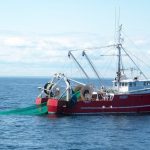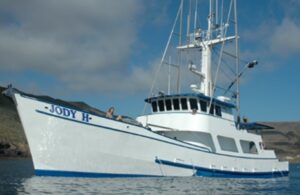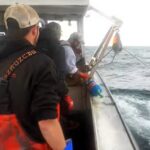North Carolina Fisheries Association Weekly Update September 12, 2022
 Below is a call to action sent out by David Sneed, Executive Director of the Coastal Conservation Association of NC (CCA), asking anglers to attend next weeks meeting of the South Atlantic Fishery Management Council and oppose proposed measures to rebuild the overfished Red Snapper stock. The measures opposed by the CCA, time and area fishing closures and the implementation of a federal reef fish permit, are meant to reduce mortality and improve the understanding of recreational effort in the Red Snapper fishery, which the most recent assessment suggests is overfished with overfishing occurring.
Below is a call to action sent out by David Sneed, Executive Director of the Coastal Conservation Association of NC (CCA), asking anglers to attend next weeks meeting of the South Atlantic Fishery Management Council and oppose proposed measures to rebuild the overfished Red Snapper stock. The measures opposed by the CCA, time and area fishing closures and the implementation of a federal reef fish permit, are meant to reduce mortality and improve the understanding of recreational effort in the Red Snapper fishery, which the most recent assessment suggests is overfished with overfishing occurring.
CALL TO ACTION
The South Atlantic Fishery Management Council meets next week in Charleston and two items on the agenda are of particular significance to offshore anglers. In Snapper Grouper Fishery Regulatory Amendment 35, NOAA Fisheries is attempting to force massive time and area closures that would result in severe, negative economic and cultural impacts to recreational fishing, boating, and coastal communities in the South Atlantic in order to prevent red snapper mortality even as bycatch. While the red snapper population is now regarded as abundant as it has ever been in modern times, NOAA Fisheries is insisting that more severe restrictions are necessary to rebuild the population to a fully recovered status. According to NOAA Fisheries, that status cannot be bestowed until older fish – 30, 40 and even 50 years old – are present in the population, which means these severe restrictions could be in place for decades.
Coastal Conservation Association has urged caution during the recovery of red snapper from historic lows, but is objecting to the massive closures as completely misguided in the face of a booming red snapper population. Among the many objections to the current proposal:
1. An independent assessment of the red snapper population is now underway – CCA is urging the Council to delay any decisions until the results of that assessment are known and verified. A similar assessment in the Gulf of Mexico produced a completely new understanding of the red snapper population there.
2. Recreational discard data is perhaps the least reliable in the entire management system, relying solely on angler recall and interpretation. New data collection systems – designed and managed by the states – are desperately needed for more timely and accurate estimates.
3. Federal fisheries management must be reformed to address the absurdity of a stock being declared above historic abundance, yet still being classified as overfished and undergoing overfishing, and therefore subject to wildly inappropriate regulations.
The other related item up for discussion next week is Snapper Grouper Amendment 46, which is exploring implementation of a federal reef fish permit. CCA has long supported better data and efforts to define the universe of anglers for improved management. As noted above, there is a critical need for more accurate and timely estimates of the recreational catch and discards. However, NOAA Fisheries track record of recreational management is exceptionally poor.
If a mechanism is needed to improve recreational data in the South Atlantic, CCA is urging South Carolina, North Carolina and Georgia to join Florida in creating state-based systems to provide more timely and accurate data for management of the recreational sector. Nothing in NOAA Fisheries management history of the recreational sector indicates a federal permit will produce the desired results or be used entirely as originally intended. Given recent comments from federal managers, CCA is concerned such a permit in federal hands will eventually be proposed to limit entry in the recreational fishery.
The South Atlantic Fishery Management Council is meeting Sept. 12-16 at the Town & Country Inn, 2008 Savannah Highway Charleston, South Carolina. The public can make comments to the Council at 4 p.m. on Wednesday, Sept. 14. The public may also submit online comments HERE.
In the CCA’s call to action, Sneed states “NOAA Fisheries is attempting to force massive time and area closures that would result in severe, negative economic and cultural impacts to recreational fishing, boating, and coastal communities in the South Atlantic in order to prevent red snapper mortality, even as bycatch.”
Even as bycatch! Really?
For decades now, the CCA has done their best to turn “bycatch” into a four-letter word, especially commercial bycatch.
They’ve used the term “bycatch” to justify their failed attempts to enact net bans and gamefish bills! They’ve used the term “bycatch” to justify banning shrimp trawling in North Carolina! They’ve used the term “bycatch” to justify almost every current restriction on commercial fishermen and commercial fishing gear! They’ve used the term “bycatch” to justify their constant support for draconian harvest reductions for both the commercial and recreational sectors! They’ve used the term bycatch to divide the recreational and commercial communities, turning neighbor against neighbor!
But now they have the nerve to say “even as bycatch” as if the CCA has no concerns at all over bycatch.
Why?
The truth is, the CCA uses terms like overfished, overfishing, cryptic mortality, overharvest, and bycatch to push for reduced harvest for both commercial fishermen and recreational anglers because it benefits them not the resource.
Need proof? Well, here it is!
In the late 90’s the CCA pushed for strict recreational and commercial restrictions in the Red Drum fishery which led to the current, 18–27-inch slot limit, 250,000 lb. annual commercial harvest cap, gill net attendance requirements, and 1 fish daily recreational bag limit. Over two decades later, these restrictions remain in place mostly due to a lack of data, not lack of fish. But rather than push for better data collection or discourage anglers from targeting these fish until the stock is deemed recovered, the CCA encourages anglers to target Red Drum, even the spawning stock, going so far as to hold fishing tournaments for this supposedly imperiled stock.
The CCA took a similar position on the management of Striped Bass where they supported strict harvest reductions, even a 10-year harvest moratorium, but opposed area or seasonal closures to prevent the targeting of Striped Bass on their spawning grounds. Once again, the CCA encourages anglers to target an “overfished”, stock, even on the spawning grounds, and holds fishing tournaments targeting Striped Bass despite the fact that recreational dead discards have become one of the dominant sources of Striped Bass mortality.
CCA NC Inside/Out Catch and Release Fishing Tournament | iAnglerTournament
The same strategy was used, by the CCA, in the Southern Flounder fishery where they pushed for, and received, a 72% harvest reduction resulting in a harvest quota for both the recreational and commercial sectors based on total removals (harvest and dead discards), paybacks for quota overages, short harvest seasons and a 1 flounder daily recreational bag limit.
While many anglers patiently wait for the flounder harvest season to open, others, encouraged by the CCA, target Southern Flounder outside of the harvest season, participating in the CCA’s catch and release tournament, increasing dead discards which count against the already low recreational quota!
CCA NC 2022 Inshore Open | iAnglerTournament
Holding fishing tournaments for “overfished” species, targeting the spawning stock, and increasing waste through increased recreational dead discards doesn’t sound like “conservation” does it?
The truth is, the CCA only supports the “conservative” approach when it results in a direct reduction in harvest and increased access/allocation for themselves, the catch and release sector.
Still not sure? Let’s take a look at Red Snapper.
The CCA seems to have no issue with a 2-to-3 day recreational harvest season and 1 fish daily bag limit for Red Snapper but opposes time and area closures to decrease “bycatch” removals in the form of dead discards. According to NOAA Fisheries data, in the 5-year time period from 2015-2019 91,300 Red Snapper were removed through recreational harvest and 2,803,280 Red Snapper died as a result of recreational dead discards.
That’s right, waste, or recreational dead discards of Red Snapper exceed recreational harvest by more than 30x, but the CCA is willing to jeopardize all recreational harvest and the stocks potential to fully recover just to protect their ability to catch and release fish.
What a privileged group they must be to proclaim a memory is more valuable than a meal!
The CCA argues that “recreational discard data is perhaps the least reliable in the entire management system, relying solely on angler recall and interpretation.”
Of course, the same could be said for all of the fisheries mentioned above, but it never was, at least not by the CCA. When recreational discard data, as unreliable as it certainly is, is used to reduce harvest the CCA quickly becomes a champion of the resource, demanding that managers ignore the economic consequences and manage solely for the resource.
But, when the shoes on the other foot and catch and release access is threatened, they shift from conservationist to capitalist begging managers to consider the “severe, negative economic and cultural impacts to recreational fishing, boating, and coastal communities.”
The sad truth is, the CCA speak for themselves not the resource and while their message seeks to hide this truth their actions clearly expose their true agenda. Another sad truth, is fisheries managers across this country have, for the most part, ignored the impacts of “sport fishing” and the countless millions of dead and wasted fish that have fallen victim to the catch and release “conservation strategy.”
Now let me be clear, I’m not opposed to catch and release fishing, fishing for personal consumption or commercial fishing, they all have their place. That said, the law requires fair and equitable management of our fisheries and that cannot be accomplished until all sources of mortality, even catch and release mortality, are addressed and all stakeholders feel the sting of management, not just those who harvest fish.
Until managers reject this modern concept of “conservation” and address the impacts of recreational discard mortality the concepts of sustainable fisheries and fair and equitable management are nothing more than a farce.
The CCA’s strategy reduces harvest, increases mortality and waste, slows or even prevents rebuilding, and assures unprecedented and unlimited access to the privileged few who fish solely for fun, not food.
Once again, rules for thee, not for me!













































